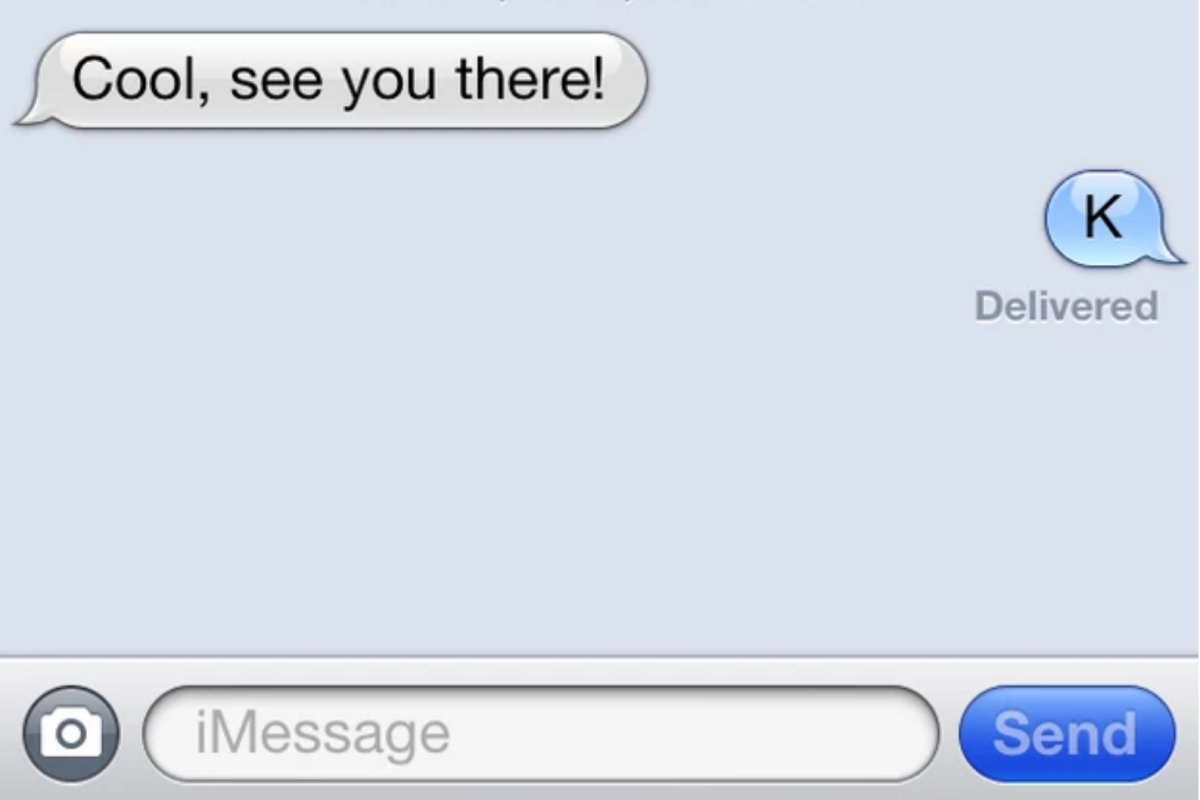Sometimes the internet goes over our heads. Luckily, we have a college student on staff to help us navigate those times. This is the many ways to text “okay,” youthsplained.
The ways in which we communicate via text have changed a lot since the days of AOL instant messenger. It’s no longer acceptable to tyypppeeee liiiikeee thiiiiiis. Or end a sentence with a million exclamation points. And if you have a choice in font, you must never choose Comic Sans, or consider choosing Comic Sans … in fact, maybe just don’t even look at it.
Text abbreviations have also changed, not so much in what they’re abbreviating, but in their ability to completely change the tone of a sentence.
Giving some advice to a friend but don’t want to be held accountable if they take it and fuck up their life even more? Slap a “but idk” at the end of that sentence, a signal that they should take your words of wisdom with a grain of salt. Telling someone your deep, dark, intimate secrets, but damn does it sound a little too serious? Make sure to add that “lol” or “lmao” to the end of those, because you’re casual and all that emotional trauma you’ve endured for years isn’t even that big of a deal. You’re fine, we’re all fine lol.
But communicating via text is also a dialect that’s still — relatively — in its infancy, which can lead to a lot of confusion and misunderstanding. In an interview with Vox about whether the internet is destroying language (it’s not), linguist Gretchen McCulloch says that generational differences can impact the ways we send and interpret texts.
“For example, a user from [one] generation may use periods at the end of every sentence. A person from another generation may interpret this as passive aggression. You can write the way you want to talk, but we need to have some communication about the means in which you are expressing it to avoid communication difficulties and misinterpretations.”
While McCulloch says that there is no right way to use language online, I would argue that there are a few rules pertaining to the world of texting and the internet that should be universally understood and followed so that we can avoid those “communication misinterpretations.” And if there’s one page we should all be on, it’s how we use the word “okay.”
The word “okay?”
Yes, the word “okay.” The one word we all use, constantly, in text and IRL, most frequently to inform others that we’ve received their message, whether that be true or not.
There are many different ways one can text the word “okay.” You can spell the whole word out (okay), only use the first two letters (ok), or use a double (kk) or single (k) k. All of them connote different things. Very, very different things.
But all of these seem fine to me?
Well, I hate to break it to you, but you have probably made a lot of people feel shitty.
The only form of okay that can be used without misinterpretation resulting in the demise of a relationship is “kk” (and I’d argue “okay,” but we’ll get to that later). “Kk” is the closest to gotcha. It means message received, roger that. You’re on your way? Kk. Great, got it, we’re good. Pure acknowledgment. It’s cute and fast to type.
“Okay” is obviously the most professional way to type the word, and I will vouch that it is also safe to casually use in text messages. Some disagree that “okay” can sound sarcastic or stern, especially when paired with a period. Which isn’t wrong — sentences do invoke a more serious tone when there are periods involved. But the reason why okay is, well, okay, is because it’s the longest form of the word. You took the time to type out those additional two letters, and that counts for something.
Now listen very closely: you should opt out entirely from using “ok,” if you can, but especially “k,” unless you want someone to know that if they were on fire, you would happily watch them burn.
Wait, so I can’t use “K?”
No! At least not in response to a harmless message. If you absentmindedly send a “k” to someone who understands its true meaning, their heart will sink, their hands will stop working and they’ll struggle to understand why you hate them. Is that what you want?
When you send a “k,” what you’re saying is: I don’t care what you’ve said and I don’t want to talk to you anymore. Or as Urban Dictionary so eloquently puts it, “The text you receive from your girlfriend, really meaning ‘fuck you.’’ A single K is cold, it cuts quick but deep. And if you get a k period (k.), don’t go home for at least 48 hours.
The origins of the dreadful “k” can’t exactly be pinpointed, though it’s been a thing since iMessage looked like this, so basically the Stone Age. People voiced their disdain for short responses — “k, ok, lol” — on Facebook pages and through memes years ago. And everyone pretty much agreed that yeah, when you type out an extremely long, emotionally charged paragraph to someone and they respond with one letter, it’s pretty infuriating. From then on we’ve been conditioned (or traumatized) to react in a similar manner to the single k. Even when it’s just in response to a simple, harmless sentence, it can still feel like a dig:
On the other side of receiving ks is, of course, sending them. Most of us who have distressingly overanalyzed a “k” text have sent one ourselves, and with intent. That’s the beauty of internet lingo — you can evoke so much power and emotion with one little letter. You no longer have to waste your time explaining to someone what they did to piss you off; you simply send a k and they will (quickly) figure it out themselves.
It’s also important to note that to some, “ok” has reached “k” status, and I’ll admit when I get an “ok” it is a little offputting. But I wouldn’t worry about this one too much unless you get an “are you mad at me?” in response, in which case you should apologize and stop using it.
I know I just threw a lot at you, and maybe you’re frantically texting out apologies or trying to remember what ks are good ks and what are bad ks. But if anything, just remember this: one K is bad, two Ks are good and above all else, never, ever use three Ks.
The Charge will help you move better, think clearer and stay in the game longer. Subscribe to our wellness newsletter today.

























